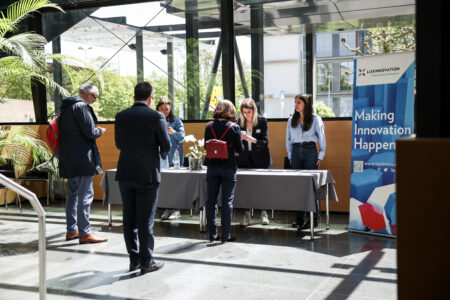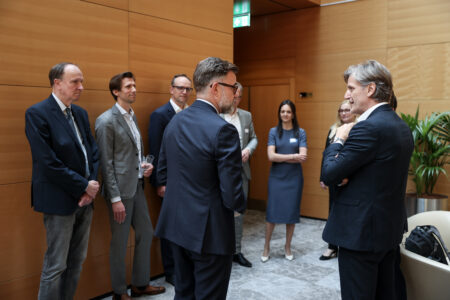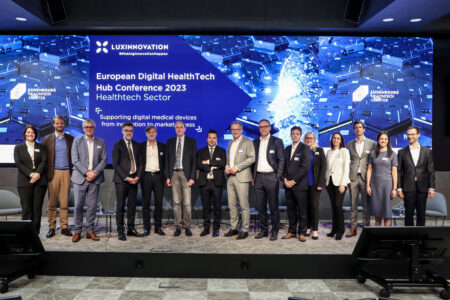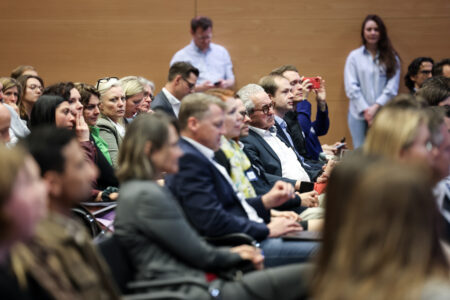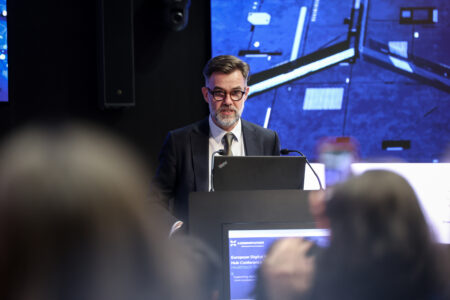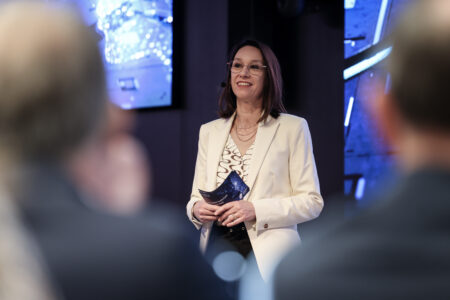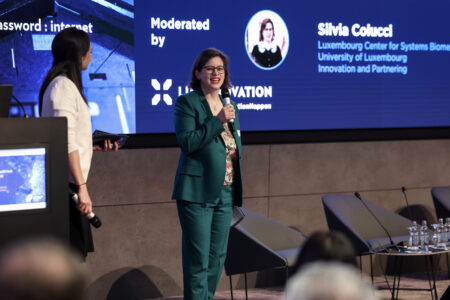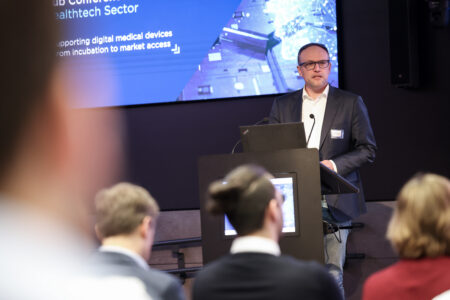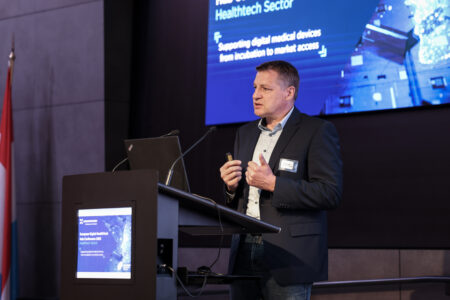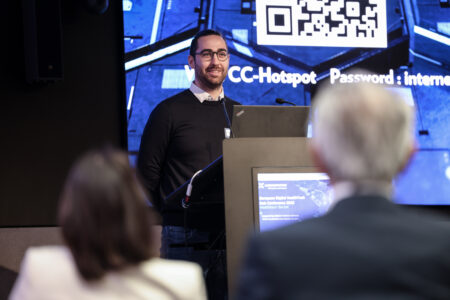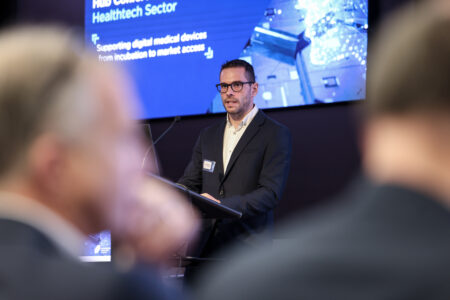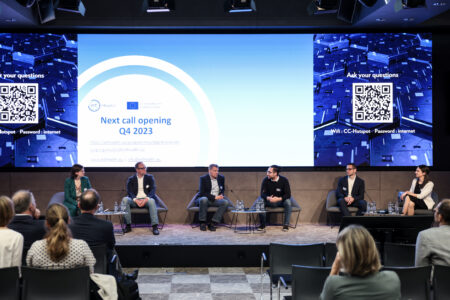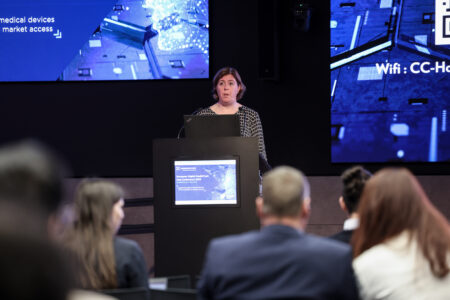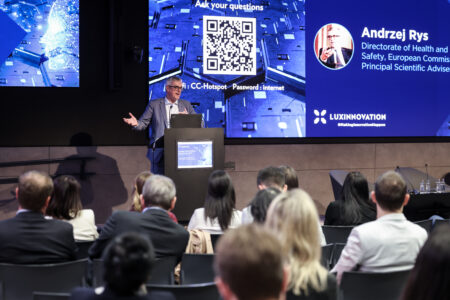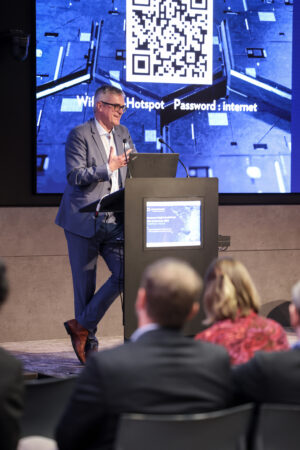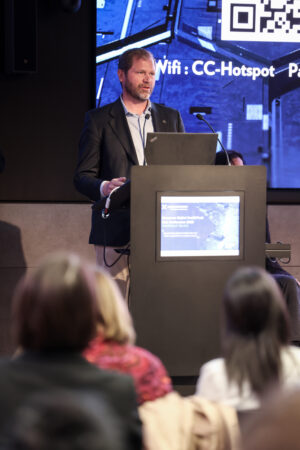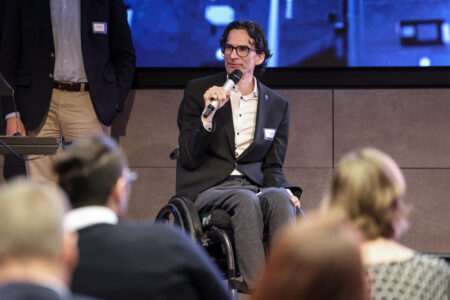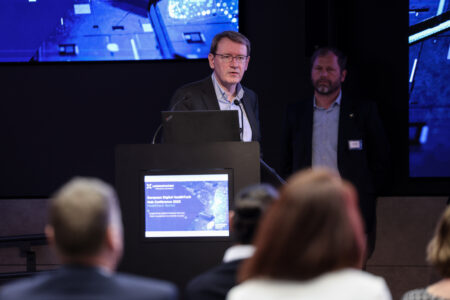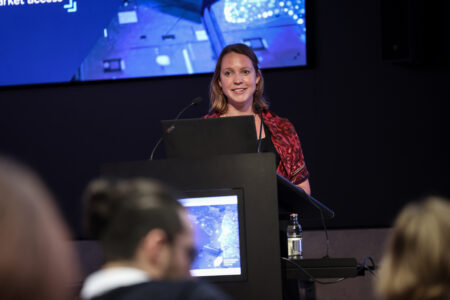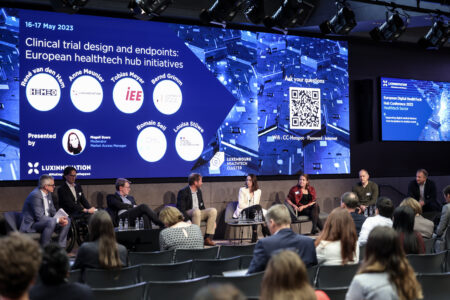New technologies are revolutionising healthcare. But before these breakthroughs reach the beneficiaries, entrepreneurs often get snared in a never-ending cycle of roadblocks that prevent their inventions from going commercial.
Over 250 healthcare stakeholders–including researchers, investors, entrepreneurs, national and regional healthtech hubs–attended the two-day European Digital Healthtech Hub Conference organised by Luxinnovation, German health cluster Medical Valley, and EIT Health. This event provided an opportunity to discuss potential solutions that can support the market launch of digital medical devices and ensure that these innovations benefit citizens and strengthen the overall European healthcare system.
“We have worked over the past years on flagship projects here in Luxembourg to boost the health sector,” explained Minister of the Economy Franz Fayot. Some of these initiatives include the new health technologies campus HE:AL, the Luxembourg Future Fund II which partly targets the health sector, joint calls for projects in the field of health technologies and many other initiatives. All of these are reinforced by the Meluxina supercomputer that can advance the development of new digital health solutions.
Digital medical devices: towards a harmonised approach
However, to successfully launch a digital medical device in Europe, undefined reimbursement methods in member states often hinder market access, even after getting the European CE medical device approval. “A CE certification doesn’t define the market or explain who bears the cost,” stated professor Jochen Klucken. Companies must still contend with national laws regarding the classification, reimbursement, and prescription of digital medical devices.
“Germany, Belgium, and France have led the way with new procedures that facilitate these aspects, but other member states can work together to harmonise standards for the various categories of digital medical devices,” Prof. Klucken advised.
A new European taskforce was established in April 2022 to categorise devices and align the health technology assessment processes used at the EU level. “If we cannot set up a harmonised framework, each member state would start developing their own processes and this will set us back at least 10 years to create the harmonised market,” warned Marcus Guardian, Chief Operating Officer at EUnetHTA.
Louisa Stüwe, from the Ministerial eHealth delegation of the French Ministry of Health, presented the new French fast track pathway (Prise en Charge Anticipée “PEC-AN”) that provides a transitional one-year reimbursement period for digital health solution manufacturers. With this new pathway, France catches up to the two leading European countries, Germany and Belgium. The conference provided an excellent opportunity to compare the difference between these market entry programmes for digital medical devices.
Onboarding private investors is essential
Regarding funding, Isaac Middlemann, Interim Managing Director at EIT Health InvestHealth, stated that private investors and stakeholders such as industrial actors, health insurers, hospital networks, and patient associations are a “key missing piece” of the puzzle. “The data shows that, without private sector investment, digital medical device startups will not be able to access the market on an industrial scale or deliver their innovations to patients,” he cautioned.
In 2021, over 15,000 patent applications were filed in Europe in the field of digital health but 70% of health professionals still do not use digital solutions and only 15% of VC funding went to EU based digital health companies.
EIT Health and its partners pioneered a fast-track initiative to support the reimbursement of digital health startups and provided around €350k in non-dilutive grant capital. Over €3 billion was raised by 79 startups thanks to a public-private co-investment programme set up together with the European Investment Fund to derisk and connect startups with corporate investors. These include 11 digital medical device companies.
Digital health companies: best practices
Companies and investors also exchanged on best practices and expectations to support digital health solutions. Victor Stephani, Chief of Staff at HelloBetter, a German startup for digital therapeutics with a patient base of over 40,000 explained its pathway to being listed on the German DiGa directory. This is the official register for all approved digital health apps in Germany that allows doctors to prescribe digital healthcare apps and enables reimbursements to listed companies. Hellobetter owns six of Germany’s total 48 DiGas, and despite an initial denial, the company still raised capital owing to “a lot of trust between investors and startups.”
Cédric Spaas, CEO of Arspectra, a Luxembourg-based medical augmented reality company that recently received the EIC accelerator grant, explained for his part that “companies need to show an innovative product with a lot of potential, a great team, and commercial interest,” but that “the regulatory risks are also important.” While many unsuccessful applications preceded this milestone, he added that the highly competitive programme “will challenge the product and service to the maximum and enables collaboration with senior advisors who support in every aspect of regulatory and market strategy in Europe and beyond.
“EIC increased our credibility with investors and commercial partners, and it is complementary to our next steps,” he explained.
Financing instruments for innovative digital health startups
To what extent do regulations feed into financing decisions? Investors at the panel explained that while regulatory aspects are a key part of the decision-making process, the science and value proposition is also prioritised.
Attributes like a sound team, strong science and IP, a robust value proposition, long-term vision and proven business acumen were mentioned as key elements investors look out for. Jérôme Wittamer, Founding Partner at Expon Capital in Luxembourg explained that they provide early stage until series C funding ranging from €500k to €10 million.
Stefano Pozzi Mucelli, Head of European RDI Support at Luxinnovation, presented R&D and innovation funding opportunities that companies can benefit from, reiterating the EIC accelerator as a prime example. “EIC supports companies and ideas from the very beginning until market launch and allows the scale up of innovation.”
For companies that are more mature, Investment Officer at the European Investment Bank, Nicolas Di Prata, highlighted available venture debt loans worth up to €15 million to scale up innovation-driven companies. “When the proof of concept is over and the product development is close to the end, but still the company has not reached commercialisation, this is a crucial stage when venture debt capital is quite relevant,” he said.
Europe has created a supportive environment for innovative digital medical device companies and can do more to ensure that these European innovators remain within the ecosystem by providing more support and developing the regulatory aspects that facilitate market launch. “It is a long-term game and we’re going to need capital to deploy and build European champions like the SAPs of the world,” explained Wittamer.
Training new medical algorithms with data
During the last day of the conference, several discussions on patient data and clinical investigation procedures were held. “Even if some standards are in place, it can still be very challenging to deploy digital health in practice and to anticipate both the primary and secondary use of data in the European data spaces. The competitiveness of Europe in the field will probably be linked to its capacity of being able to use the data for research and the training of new medical algorithms from these data” said Jean-Philippe Arié, Cluster Manager – HealthTech at Luxinnovation. “European Data Spaces, as described in the data strategy of the European Commission, will tremendously accelerate the societal and medical transitions in more intelligent ways, through the efficient and responsible use of data”, stated Bert Verdonck, Chief Executive Officer at the Luxembourg National Data Exchange Services (LNDS).
The conference was also a great opportunity for participants to make new connections during the breaks, the B2B sessions and networking cocktails.
Photo credit: Sophie Margue/ Luxinnovation

